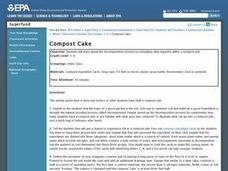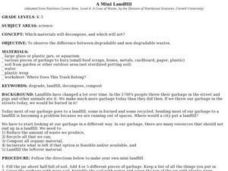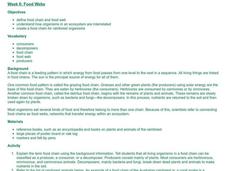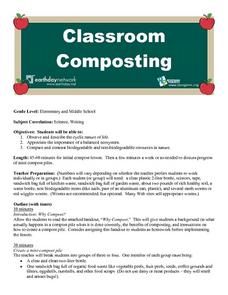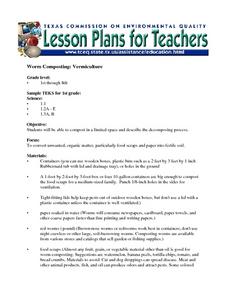Curated OER
Compost in a Bag!
Fourth graders experiment to see which objects decompose. In this compost instructional activity, 4th graders observe the changes of labeled objects in a bag. Leave the objects for one month and record the changes by observation and...
Curated OER
Compost Cake
Students examine the decomposition process. They create their own class compost pile and record their observations. They discover which materials decompose at a different rate.
Curated OER
Pollution and Marine Life
In this pollution and marine life activity, students use 9 given terms related to types of pollution and ocean food chains to complete sentences. Students number the effects of human sewage and soil runoff that harm ocean organisms in...
Nuffield Foundation
Observing Earthworm Locomotion
One acre of land can contain more than a million earthworms. Scholars collect earthworms to observe their movements. Once placed on paper, the sound of movement often fascinates pupils. When placed on glass, the earthworm is unable to...
Curated OER
A MINI LANDFILL
Learners observe the difference between degradable and non-degradable wastes. They create their own landfill in a jar by adding four or five pieces of garbage and then covering it with dirt and water. They make observations on what they...
Curated OER
RIDE THE WILD LEAF
Students identify and interpret that leaves provide food for new trees and plants. Students cut out leaves and glue them on the appropriate
number on included worksheet. Students collect different types of leaves and make leaf rubbings....
Curated OER
Cows, Worms, and Compost
Learners study decomposition. In this decomposition instructional activity, students discuss the background information about decomposition. Learners then complete the 'Chew It Twice' worksheet.
Curated OER
Rocks and Minerals
Students are able to describe earth processes (e.g., rusting, weathering, erosion) that have affected selected physical features in students, neighborhoods. They are able to identify various earth structures (e.g., mountains, faults,...
Curated OER
Food Webs
Pupils research rainforest animals and use that information to make a flow chart to show the order in which energy is transferred through several organisms. They label the producers, consumers, and decomposers in their chart.
Curated OER
Classroom Composting
Students discover the benefits of composting. They identify the steps of decomposition as well. They are read a book and discuss what items decompose.
Curated OER
Everything's Connected
Learners explore how trash decomposes. In this ecosystem lesson, students discuss new vocabulary words, such as producers and consumers, and think critically to answer how landfills work.
Curated OER
Worm Composting: Vermiculture
Students set up their own composting bin. They observe and record their findings during a period of time. They describe the decomposing process as well.
Curated OER
Composting Leftovers
In this composting leftovers worksheet, students set up an experiment with food waste and soil, observing and recording the differences for two weeks.
Curated OER
Ecosystem Energizers
Fourth graders see how the flow of energy through an ecosystem made up of producers, consumers, and decomposers carries out the processes of life and that some energy dissipates as heat and is not recycled.
Curated OER
Rainforest Vocabulary Words: Week 1
In these rainforest vocabulary worksheets, read the definitions and the matching terms for the following rainforest vocabulary terms: decomposers, deforestation, epiphytes, extinct, environment, pollute, vegetation, ecology, climate,...
Curated OER
Permafrost: Permanently Frozen Ground
Students explore permafrost. In this 3 states of matter lesson, students identify characteristics of solids and liquids. Students observe water and soil melting and freezing at various temperatures. Students make...
Curated OER
Collecting Compost
Students observe a composting box. In this soil lesson, students create a composting bin by using a bin, newspaper, worms, and food scraps. Students create a composting food web.
Curated OER
Big Fat, Juicy Worms
Students collect and study information about worms. They discover how an earthworm helps process and loosen the soil. They write in their journals as well.
Curated OER
Life in a Log
Students identify insects living in rotting logs. In this decomposition lesson plan, students observe pieces of a rotting log, they look at the insects that have inhabited the log and create a chart that shows their findings.
Curated OER
Forests
Middle schoolers examine soil in forests looking for animals and insects. They divide the animals based on their number of legs and draw the animal they have collected.
Curated OER
The Compost Bucket
Students recognize that plants and soils have a close relationship. They view a photo essay on the common practice and natural process of composting. Afterwards, they observe the process of plant decay over the course of several days.
Curated OER
Investigating the Uses of Backyard Bacteria
Students discover that the answers to some of society's waste and clean-up problems may be no further than the soil beneath their feet. They perform a Gram stain on the colonies to determine some of their characteristics.
Curated OER
Decomposition
Learners create a compost pile and chart changes as the materials decompose. Students draw pictures of items placed into their "landfill" and predict how and whether the item will change or not. After two weeks, learners write...
Curated OER
Decomposition
Learners create a compost pile and chart changes as the materials decompose. Students draw pictures of items placed into their "landfill" and predict how and whether the item will change or not. After two weeks, learners write...
Other popular searches
- 4 Soil Decomposers
- Types of Soil Decomposers
- Four Soil Decomposers
- Ten Soil Decomposers
- "4 Soil Decomposers
- Exambles of Soil Decomposers
- \"4 Soil Decomposers



